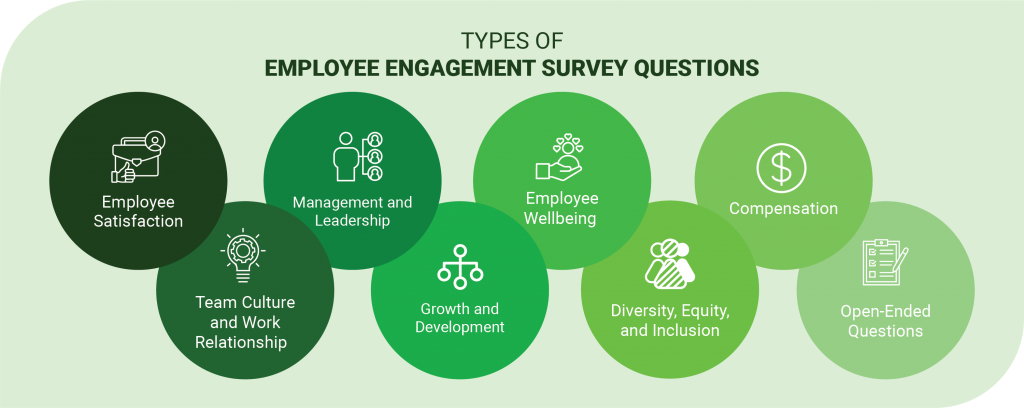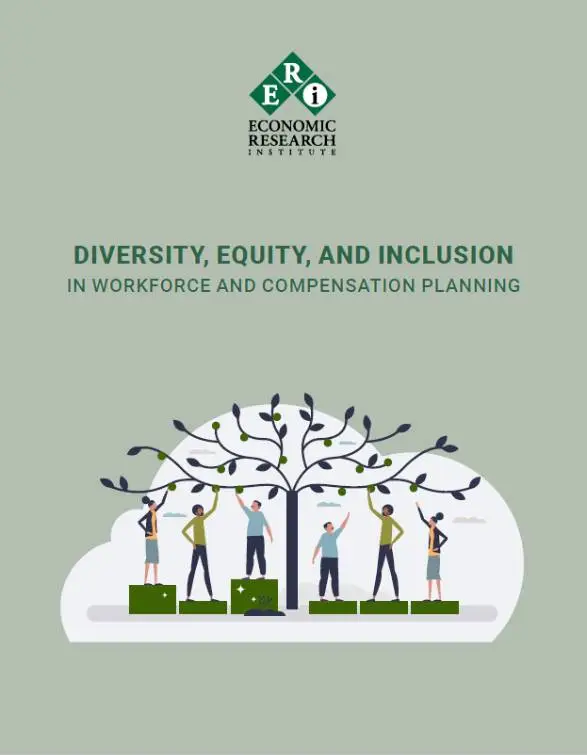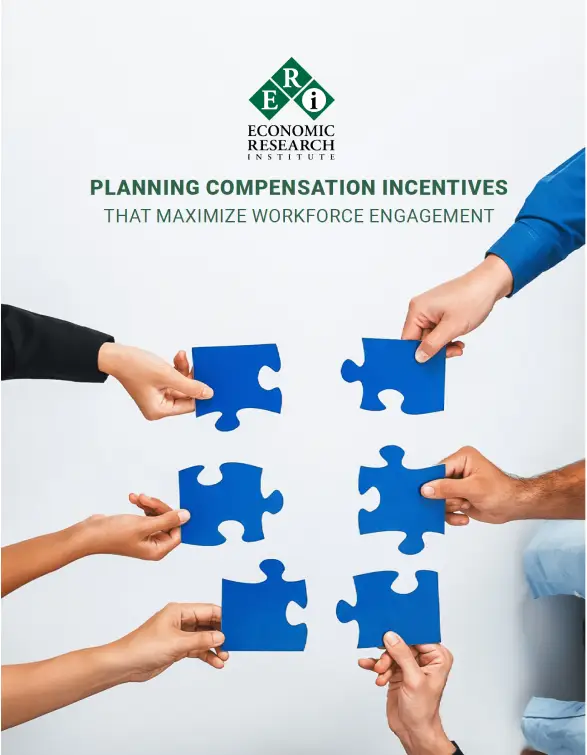In the modern workforce, it is important to align employee salaries with the overall culture and structure of an organization to maintain a motivated and engaged workforce. Employers must stay on top of the changing workforce, learn what employees value in a company, and implement those changes to retain top talent. One way to do this is to conduct employee engagement surveys to allow your employees to provide honest feedback about the company, work, and team anonymously.
What Are Employee Engagement Surveys?
Employee engagement surveys are structured assessments conducted within an organization to gauge the level of engagement, satisfaction, and commitment that employees have towards their work and organization. They provide organizations with honest insights into the collective sentiment and experiences of their workforce. When organizations conduct engagement surveys, employees will know that their opinions are valued.
The Benefits of Employee Engagement Surveys
Conducting employee engagement surveys serves many benefits to your whole organization:
- Provide Employees with a Voice: These surveys act as a platform for employees to candidly voice their opinions, concerns, and suggestions, fostering a culture of open and transparent communication within the organization. If employees know that they are being heard and can voice their ideas or concerns, they are more likely to stay at a company longer.
- A Guide for Organization Improvement: By actively seeking feedback, organizations can pinpoint specific areas that require attention and improvement. This feedback leads to meaningful improvements in work conditions, ultimately boosting overall employee satisfaction.
- Track Employee Feedback Over Time: Regular administration of employee engagement surveys allows organizations to track employee dedication and enthusiasm over time. This provides valuable insights into the effectiveness of interventions and initiatives aimed at improving employee engagement.
- Keep Leadership Accountable: Senior management and HR are responsible for taking action to shape the entire company culture. Conducting an engagement survey lets leadership know where to target their efforts and improve the company.
How to Build an Effective Employee Engagement Survey
To maximize the benefits of this survey, organizations should consider these overall best practices:
- Have Clear Objectives: Define specific goals and outcomes for the survey to ensure that results are aligned with organizational objectives. What do you hope to achieve with the survey? Are you focusing on overall engagement, specific aspects like job satisfaction or compensation, or a combination of factors? Having clear goals will guide the entire process.
- Provide Anonymity and Confidentiality: To obtain honest and open feedback, it is essential to ensure that responses are kept anonymous and confidential. Employees should feel comfortable sharing their thoughts without fear of any consequences.
- Prepare Well-designed Questions: Questions should be clear, concise, and designed to collect actionable data regarding issues that you are aiming to improve. Try to ask open questions that allow employees to elaborate and not just provide simple “yes” or “no” answers.
- Communicate Progress: Transparency in sharing survey results and taking concrete action based on feedback demonstrates a commitment to continuous improvement and reinforces employee trust.
- Implement Follow-up Actions: Utilize survey results to develop actionable strategies for improvement. When actions are taken, employees will feel valued and appreciated.
- Conduct Surveys Frequently: The appropriate frequency of surveys depends on your organization’s needs and the time it takes to implement changes based on survey feedback. Some organizations conduct them annually, while others opt for quarterly or semi-annual surveys.
Types of Employee Engagement Survey Questions to Ask
There are many types of questions to ask during an employment engagement survey. Figure out which questions relate to your company and what you are trying to improve. Questions can fall into various categories:
- Employee satisfaction
- Team culture and work relationship
- Management and leadership
- Growth and development
- Employee wellbeing
- Diversity, equity, and inclusion
- Compensation
- Open-ended questions

Now that you know what types of questions to ask, here are some specific examples of employee engagement survey questions to get you started.
Employee Satisfaction Questions
Having satisfied employees means that employees are eager to come to work and go beyond their set responsibilities. It is important for employees to feel appreciated for their work so that they continue to do their best and help the company grow. Here are some questions to ask to learn more about employee satisfaction:
- How to do feel about your workload?
- Would you recommend this workplace to your friends and why?
- How do you feel about working with your team?
- Is the work you do meaningful?
- Do you feel appreciated for the work that you do?
Team Culture Questions
Most of us spend considerable time collaborating with our coworkers. It is important to create a positive and engaging work environment to increase employee retention. To learn how to improve team culture, consider the following questions:
- How do you feel about your company’s mission, vision, and values?
- What are some issues regarding company culture that we can improve?
- Is your team able to communicate effectively with other teams to accomplish a task?
- Do you feel like you are part of a supportive team?
Management and Leadership Questions
Fostering an open employee and manager relationship is one of the most important ways to keep satisfied employees. A manager is the gateway for an employee’s satisfaction because they have a leading role in career growth, salary, and everyday work life. A good manager wants to see an employee succeed and continue to contribute to the whole company. According to Gallup’s State of the American Manager report, one in two employees have left a job to get away from a manager and improve their overall life. To gain insight on how to improve management skills, ask these questions:
- Do you feel that your manager communicates clear goals to you and your team?
- Does your manager give actionable feedback on a regular basis?
- Do you feel that your supervisor and company are invested in your success?
- Can you have open and honest conversations with your superiors or HR about any concerns or issues you may have?
- What do you like or dislike about the management style of your superiors?
Growth and Development Questions
It is important to have options for employees to advance their careers through promotions and new opportunities. If employees do not see any potential in career growth, they may not stay long and will seek new opportunities. Make sure that employees are in roles where they can grow and learn new skills. You can ask the following questions:
- Do you see a clear path for career advancement?
- Do you have the tools to be successful at your job?
- What resources do you need to excel in your position?
- Do you see yourself working here in the next year?
- Have you had a meaningful conversation with your manager about your career development?
- Is your work positively challenging?
Employee Wellbeing Questions
An employee’s wellbeing can often be overlooked, especially in remote work situations. It can be difficult to detect issues such as burnout, exhaustion, and poor mental health. Keeping an eye on an employee’s wellbeing will help prevent any surprises if an employee decides to quit. To get an idea of how your employees are doing, ask these questions:
- Does our company foster a comfortable and supportive workplace environment?
- Does your work allow you to have a healthy work-life balance?
- Do you have a manageable workload?
- What type of work schedule fits with your lifestyle (e.g., work from home, hybrid, etc.)?
Diversity, Equity, and Inclusion Questions
We work with people from diverse backgrounds, and organizations should understand how diversity, equity, and inclusion play a role in the workforce. Organizations should identify any issues that employees are facing, such as gender pay gap and inequality in the workforce, and address them properly. Here are some important questions to ask:
- Do you think that the company is comprised of a diverse workforce?
- Is there equitable access to resources and opportunities?
- Do you believe the hiring process is fair and unbiased?
- How effective are the organization’s diversity and inclusion policies?
- What improvements or changes can we make to foster a diverse, equal, and inclusive environment?
Compensation Questions
As an HR professional, you need to make sure that employee’s salaries are continuously competitive with the market and updated as roles change and grow. Use ERI’s Assessor Platform to help with the compensation planning process. Employees will stay motivated if they feel like they are adequately compensated. If employees can see that there is the potential to earn more benefits, such as holiday bonuses or merit increases, then they will work harder and stay longer. Use the following questions as a guide to your compensation planning:
- Are you satisfied with your current compensation and benefits?
- What changes to your compensation do you feel like you deserve based on your contribution?
- What additional compensation and/or benefits would you like to see?
- How does our compensation compare to that of other companies in our sector?
- Can you discuss compensation openly with your superior?
How to Conduct an Employee Engagement Survey
There are many tools available to conduct an employee engagement survey online. Using an online tool makes it easy to analyze employee feedback and encourages a high participation rate because it is easily accessible. Most organizations use electronic surveys because they are more efficient, faster, and use fewer resources. However, if you have employees without access to online tools, then distribute the survey in an alternative format, such as a printable form. Keep in mind the importance of structuring your survey to maintain anonymity.
Why Use ERI?
The purpose of employee engagement surveys is to provide insight into strategic imperatives in today’s competitive workforce and help HR professionals make better business decisions. By actively engaging employees through structured surveys and ensuring fair compensation, a positive work environment, and career growth, organizations can tap into the true potential of their employees, driving success. The purpose of employee engagement surveys is not just conducting them as a formality, but taking actions based on the response and valuable feedback to foster a positive workplace environment and grow the company.
When building your employee engagement survey, it is important to be prepared with the right questions and have an action plan when the results are compiled. ERI Economic Research Institute provides tools to easily benchmark salaries and stay up to date on compensation news to help with the salary planning side of your survey. ERI’s Salary Assessor provides a detailed platform to streamline compensation management, determine competitive salary levels, compare employee salaries with market benchmarks, and more with instant access to employer-reported compensation survey data online. More specifically, our Salary Assessor assists with the following tasks in compensation management:
- Write accurate job descriptions
- Track hot jobs
- Define pay grade structures
- Plan merit increases and incentives
- Track employee and company performance
- Analyze pay equity for protected groups, such as gender, disability, race, etc.
- Monitor internal compensation using compression checks and peer analysis
- Communicate the salary planning process effectively
With reliable and current data, you can then provide your employees with better insight into their compensation and be prepared to answer any questions during the employee engagement survey process.



